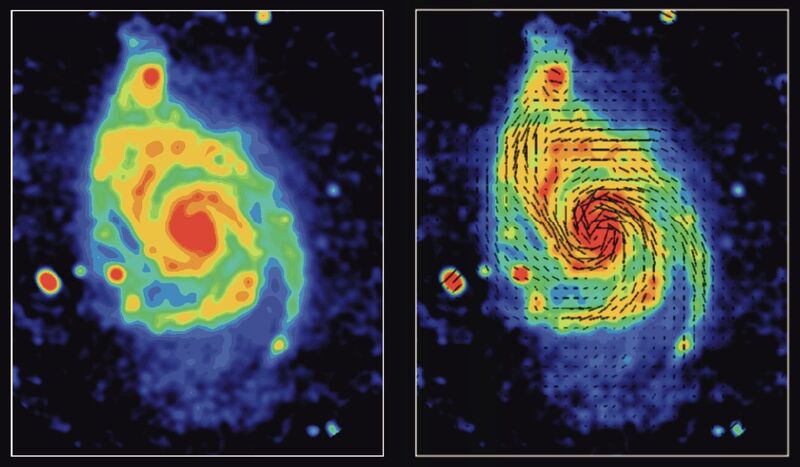Magnetic Field Lines in M51
Description
The total radio continuum emission from the "whirlpool" galaxy M51 (distance estimates range between 13 and 30 million light years) is strongest at the inner edges of the optical spiral arms, probably due to the compression of magnetic fields by density waves. The vectors give the orientations of the regular magnetic fields as derived from the polarized emission. The field lines follow nicely the optical spiral arms. Unexpectedly, strong polarized emission is observed also between the optical arms which indicates the action of a dynamo. This image was observed with the VLA in its most compact configuration at 6cm radio wavelength (broadband continuum). As the VLA cannot detect the diffuse, large-scale radio emission, data from the Effelsberg 100-m telescope in Germany at the same wavelength was added.
VLA in D-array. VLA observations made 1991 March 23 and 1991 April 1; Effelsberg observations made summer 1996. VLA resolution 15"; data from Effelsberg adds 2.5 minutes of arc.
Creator
Legacy Astronomical Images
Rights
NRAO/AUI/NSF does not hold full copyright for this image. Contact the archivist for details.
Type
Legacy Astronomical Image
Object Name
M51
Investigators
Rainer Beck (MPIfR Bonn, Germany), Cathy Horellou (Onsala Space)
Telescope
Very Large Array (VLA)
Effelsberg 100-m
Observation Date
1991-04-00
Type of Observation
continuum
Band
C
Wavelength
6 cm
Frequency
5.0 GHz
Center of Image
RA 13:29:52.370, Dec: 47:11:40.800 (J2000)
Field of View
0.166667 x 0.200000 degrees
Notes
Contact the archivist for a high resolution tif of this image.
Series
Galaxies Series
Unit
Spiral Unit
Citation
Legacy Astronomical Images, “Magnetic Field Lines in M51,” NRAO/AUI Archives, accessed April 26, 2025, https://www.nrao.edu/archives/items/show/33567.

